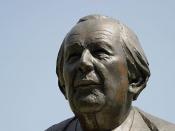Critical Thinking: The Role of Cognitive Development, Logic, and Emotionality
Definitions of critical thinking range from simple statements reflecting one's ability to create logical conclusions based on reasoning to more complex definitions which take into consideration a person's emotions, personal feelings, and cultural biases. According to the U.S. Department of Education, National Center for Education Statistics, "critical thinking is a broader term describing reasoning in an open-ended manner, with an unlimited number of solutions" (Erwin, 2000, p. 11). Critical thinking requires that "the thinker improve the quality of his or her thinking by skillfully taking charge of its very structures and by imposing intellectual standards upon them"(University of Phoenix, 2003). The structures of critical thinking include cognitive skills, emotion, personal feelings, judgments, argument, and logic.
Cognitive development plays a significant role in a person's ability to think critically. Jean Piaget "proposed the idea that cognitive development consisted of the development of logical competence, and that the development of this competence consists of four major stages"(University of Alberta, 2003).
It is not until early adolescence, around age 11 or 12, that a person enters the Formal Operations Stage and becomes capable of more sophisticated logical thought. This, according to Piaget is the final stage in human cognitive development. Other theorists contend that Piaget's initial theories are either flawed or incomplete. Vygotsky, a Russian psychologist, believes that an individual's higher mental functions develop through social interaction. In others words, humans learn from their interactions with others. "Vygotsky asserted that development is complex and is effected by social and cultural contexts. Biological and cultural development are interrelated and do not develop in isolation" (Emory University, 2003). In contrast to Piaget's four finite stages of development, "Vygotsky believed that intellectual development was continually evolving without an end point (Emory University). Proposing a fifth stage...



Impressed!
Thanks - this was very helpful in clarifying a core difference between Piaget and Vygotsky. Just what I needed!
2 out of 2 people found this comment useful.